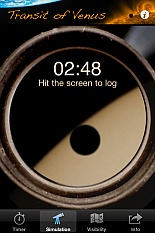On June 5/6 Venus will be seen crossing the face of the Sun, an event so rare it will not occur again this century. Millions of people are expected to look skyward for this rare celestial phenomenon.
Venus transits have loomed large in scientific history, providing the first method of measuring the scale of our solar system. Expeditions were launched by several countries to make observations of the events in 1761, 1769, 1874 and 1882 at widely separated sites around the world.
Though 20th century methods have supplanted the Venus transit in making these determinations, the important history of the event provides a link to our past. The coming transit offers a chance for modern-day stargazers to repeat those experiments - with a modern twist.
 Owners of mobile devices using the Apple and Android operating systems can now take part in the largest such effort ever thanks to a new free app developed by Steven van Roode of the Transit of Venus Project. Anyone can emulate the expeditions of old without leaving home or making lengthy measurements of their location or local time.
Owners of mobile devices using the Apple and Android operating systems can now take part in the largest such effort ever thanks to a new free app developed by Steven van Roode of the Transit of Venus Project. Anyone can emulate the expeditions of old without leaving home or making lengthy measurements of their location or local time.
Just a few clicks on a smartphone is enough, and many thousands are expected to join in. The technology used was not available even for the Venus transit in 2004 - the only other transit to occur since the 19th century - ensuring that this project will see unprecedented participation.
Astronomers Without Borders is partnering on this project to bring the app to more users and provide real-time analysis of the data on transit day. Each user's observational data is transmitted directly to the central database to be included in the analysis.
The app also offers a realistic simulation of the transit, allowing observers to practice making the measurement in advance, something done by past astronomers with mechanical simulations.
The Apple version of the app is available for free download in the iTunes App Store.
The Android version is available for free download in the Android Market.
Read more about the Venus transit app on the Steven van Roode's website.
Learn more about the Transit of Venus Project.







